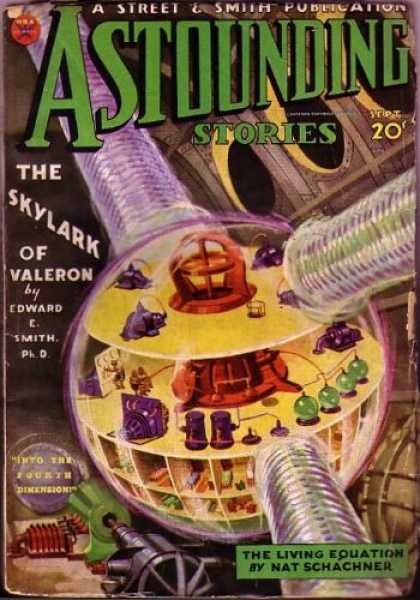|
LITR 4632: Literature of the Future |
Sample Student Final Exams 2011 Essay 2
|
 |
Katherine Fellows
Linguistic and Technological Evolution
While writing my midterm essay, I had a general feeling that writing, as
all things, may one day evolve into something better--advance and become
obsolete. After completing the second half of LITR 4632, I remain skeptical of
the permanence of written language, but I am also reminded of the humble
beginnings of the written word.
In Robert Silverberg's "House of Bones," the narrator travels backwards
in time to an early, low-tech society that communicates mostly through spoken
words. The people of this time period seem content in their communicative
options--for the chieftain of the tribe, the narrator's "silence seems good
enough"--but misunderstandings abound (87). The narrator, unable to fully
communicate under these circumstances, misses crucial information about his
assignment; he travels into the wilderness to kill the new stranger, when his
friends merely asked him to bring the stranger back to the village. The
villagers believe misguided stories about the Scavenger Folk, passed down
through generations "by bards like Paul in the epics. None of them has ever
actually seen a Scavenger. But they sure seem to detest them" (89). Perhaps due
to the impermanence of spoken language, "everyone gives everyone else his own
private set of names"--"a confusing system," according to the narrator (93). The
narrator explains that he "want[s] to learn that epic of theirs and write it
down for you to read" in an attempt to preserve some part of their culture.
While the people of this ancient civilization could teach modern-day humans much
about humanity, we could never have access to their knowledge, simply because,
despite having existed for thousands of years, without a written language, their
society lacks permanence within an evolutionary timeline.
Likewise, in Octavia Butler's "Speech Sounds," undeveloped language leads
to confusion and unnecessary violence. The story opens with "[t]wo young men […]
involved in a disagreement of some
kind," "grunting and gesturing at each other" (91). Unable to discern why the
characters are quarreling, "people watched the pair, then looked at one another
and made small anxious sounds" (91). Unable to prevent the fight without knowing
its cause, the bus riders look on worriedly until chaos eventually ensues.
Without a well-developed language, "[t]here was no more LAPD, no more
any large organization, governmental
or private. There were neighborhood patrols and armed individuals. That was
all"--while humans are a naturally social species, without language, society
fell into disarray (94). Without being able to discern probable cause or
effectively group, preventing crime became difficult (94).
In William Gibson's "Johnny Mnemonic," however, the written word appears
to be obsolete. Johnny himself is a testament to the futility of written
language and its literal insecurities--anyone can access the knowledge it
communicates, regardless of one's intended audience. Johnny serves as a reminder
of times when knowledge was meant to be passed on between people, not widely
accessible, and how an idea could die alongside those who gave it life. Gibson's
"Hinterlands" also emphasizes this view; those cosmonauts who travel to the
"Highway" and are taken return insane, yet apparently full of knowledge--thus
the creation of "Heaven." Attempts to send unmanned spacecraft on the Highway
fail, but desperate for more cures for cancer, cosmonauts continue to venture
out and, always overwhelmed by the knowledge and experiences they attain,
continue to commit suicide. "Hinterlands" presents a society in which both
written and spoken language fails to adequately communicate the ideas of an
apparently much more advanced civilization, indicating Gibson's view that, in
order to advance, we must evolve past both written and spoken words to a true
exchange of ideas.
Since the midterm, then, my ideas about language and literacy have not
changed. I still believe that, in order to advance as a civilization, we must
find better ways to communicate. Music, for instance, communicates through sound
what written notes cannot, and in this spirit, I believe that our current form
of written language will eventually become obsolete. As in "Johnny Mnemonic" and
"Hinterlands," I find that while our society is technologically and socially
capable, we have much time to evolve.
